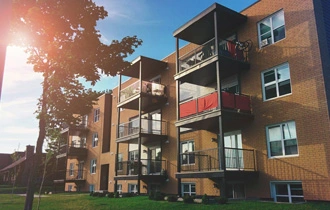Attention Homeowners:
An Essential Protection for Your Home
Home insurance is a fundamental component of every homeowner’s insurance portfolio. It protects what is likely a person’s largest investment – their home. In times when severe weather events are becoming increasingly common, home insurance is gaining even more importance. It offers comprehensive protection against financial risks that can arise from damage to the building.
Why Home Insurance is Indispensable
For homeowners, it is crucial to protect their property against various risks. Home insurance covers damage to the house caused by fire, water, storms, or hail. Additionally, other risks can be insured. Therefore, it is not just insurance but a necessary investment in the safety and preservation of your property’s value.
What Does Home Insurance Cover?
Home insurance mainly consists of three parts: fire insurance, water damage insurance, and storm insurance. These essentially cover the costs of repairs, reconstruction, and new construction arising from the aforementioned risks. Only damages to the building itself or to parts permanently attached to the house are covered.
Special Features of Home Insurance
- Fire Insurance: Protects against damages caused by fire, lightning, explosion, and implosion.
- Water Damage Insurance: Covers damages caused by water pipes, frost, and breakage.
- Storm Insurance: Covers costs for storm damages starting from wind force 8 and hail damages.
What Is Not Covered?
Important exclusions of home insurance include damages caused by gross negligence, war, civil unrest, or storm damages caused by open or leaking windows. Natural disasters like flooding or landslides are generally not covered but can be included in the coverage with an additional natural disaster insurance.
Additional Modules for Extended Protection
Depending on the risk situation of your location, additional modules such as natural disaster insurance or a separate photovoltaic insurance can be useful. These provide protection for specific risks beyond the basic coverage.
Calculating the Insurance Sum
The insurance sum is usually based on the new value of the building. There are various methods to determine the sum, including the living space tariff and the sliding new value factor, both ensuring that your building is insured at the current new construction value. A waiver of underinsurance is also recommended to avoid being left with a portion of the costs in the event of a claim.
What Does Home Insurance Cost?
The costs of home insurance vary depending on the size of the house, the insurance sum, and individual risk factors. It is advisable to regularly compare offers and ensure that the chosen policy provides comprehensive protection.
Proper Handling in the Event of a Claim
In the event of a claim, it is important to document the damage accurately and report it to the insurance company as soon as possible. Emergency measures should be taken to prevent further damages. Independent repairs should only be carried out after consultation with the insurance company.
Conclusion
Home insurance is indispensable for every homeowner. It offers financial protection against a variety of risks and helps preserve the value of your property. When choosing the right insurance, you should consider the specific risks of your location and the individual characteristics of your home.
Frequently Asked Questions About Home Insurance
1. What exactly does home insurance cover?
Answer: Home insurance provides protection against damages to your building caused by fire, water pipes, storms, and hail. It covers the costs of repairs, reconstruction, or new construction after a damage event.
2. Is home insurance mandatory for every homeowner?
Answer: In Germany, there is no legal requirement to have home insurance. However, due to the high financial risks associated with owning a house, it is highly recommended.
3. What damages are not covered by home insurance?
Answer: Typically, damages caused by gross negligence, war, civil unrest, flooding, landslides, and storm damages due to open or leaking windows are not covered. Natural disaster damages can be insured through additional policies.
4. Are natural disaster damages included in home insurance?
Answer: No, damages caused by natural events like floods, landslides, or avalanches are not included in the standard policy. A separate natural disaster insurance is required for such coverage.
5. How is the insurance sum for home insurance calculated?
Answer: The insurance sum is usually based on the new value of the building, which means the costs required to rebuild or repair the house in its current form and equipment.
6. What is the difference between sliding new value insurance and the living space tariff?
Answer: In sliding new value insurance, the insurance sum is regularly adjusted to reflect construction cost developments, avoiding underinsurance. The living space tariff calculates the insurance sum based on the living space and the house’s equipment.
7. How should I proceed in the event of a claim?
Answer: Document the damage in detail with photos and a report. Report the damage to your insurance company as soon as possible. Take emergency measures to prevent further damages and wait for repairs until agreed with the insurance company.
8. How can I ensure that my home insurance is adequate?
Answer: Regularly review the scope of your insurance and adjust it as needed. Consider new risks, renovations, or value increases of your property.
9. What happens if my house is underinsured?
Answer: In the case of underinsurance, the insurance covers only a portion of the costs proportional to the insurance sum relative to the actual value of the building. To avoid this, it is essential to choose a correct and regularly updated insurance sum.
10. How often should I review and adjust my home insurance?
Answer: It is advisable to review your home insurance at least once a year and adjust it if necessary, especially after renovations, refurbishments, or changes in the use of the building.






